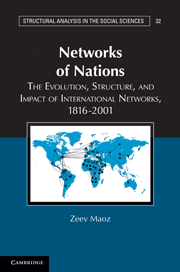Book contents
- Frontmatter
- Contents
- Preface
- Part I What Are International Networks?
- Part II The Formation of International Networks: Theory and Evidence
- Part III The Implications of the Networked International Politics Theory
- 8 Democratic Networks: Resolving the Democratic Peace Paradox
- 9 Interdependence and International Conflict: The Consequences of Strategic and Economic Networks
- 10 Evolution and Change in the World System: A Structural Analysis of Dependence, Growth, and Conflict in a Class Society
- 11 An International System of Networks: How Networks Interact
- 12 The Network Analysis of International Politics: Insights and Evidence
- Glossary
- Bibliography
- Author Index
- Subject Index
10 - Evolution and Change in the World System: A Structural Analysis of Dependence, Growth, and Conflict in a Class Society
Published online by Cambridge University Press: 05 June 2012
- Frontmatter
- Contents
- Preface
- Part I What Are International Networks?
- Part II The Formation of International Networks: Theory and Evidence
- Part III The Implications of the Networked International Politics Theory
- 8 Democratic Networks: Resolving the Democratic Peace Paradox
- 9 Interdependence and International Conflict: The Consequences of Strategic and Economic Networks
- 10 Evolution and Change in the World System: A Structural Analysis of Dependence, Growth, and Conflict in a Class Society
- 11 An International System of Networks: How Networks Interact
- 12 The Network Analysis of International Politics: Insights and Evidence
- Glossary
- Bibliography
- Author Index
- Subject Index
Summary
Introduction
There are many different ways to think about the structure of the international system. International relations scholars – mostly neorealists – argue that system structure is defined by the number of major powers and the distribution of capabilities in the system (Waltz, 1979; Mearsheimer, 2001). Structural sociologists and Marxist scholars view the international system in terms of a division of labor – some sort of international class structure (Galtung, 1971; Wallerstein, 1974; Chase-Dunn, 1975). These approaches focus on different issues and are therefore treated distinctly. International relations scholars think of systemic stability or change as variations in the relative standing of individual states and in the distribution of capabilities. Structural sociologists focus on changing patterns of dependence, economic wealth and inequality. Their view of stability or change concerns movement of states across social classes. Both approaches, however, are predicated on the idea that the international system is composed of different classes. The class affiliation of states has an important impact on their behavior. Moreover, the specific class structure of the system is said to affect its stability.
These approaches have rarely been discussed under a common theoretical umbrella. Economic relations constitute the core element of systemic stratification according to the world systems approach. Military capabilities constitute the key identifier of political stratification in international system theories. Yet, economic and military power typically correlate, so one would expect the division of labor in world system analysis to correlate with the division of the world into great (or major) powers, middle (or regional) powers, and minor powers. Moreover, the mobility of states across classes should be characterized by both patterns of economic growth or decline and parallel patterns of capability change (Kennedy, 1987). Unfortunately, we desperately lack systematic evidence of overlap between the economic class structure of the system and its stratification in terms of military capabilities.
- Type
- Chapter
- Information
- Networks of NationsThe Evolution, Structure, and Impact of International Networks, 1816–2001, pp. 297 - 332Publisher: Cambridge University PressPrint publication year: 2010

